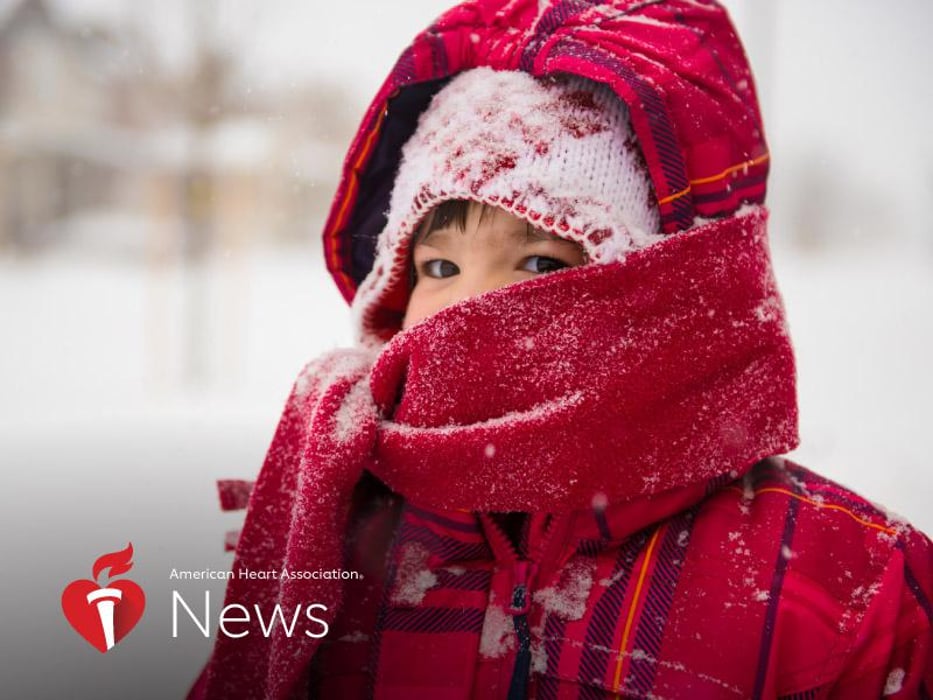AHA News: Can the Cold Really Make You Sick?

FRIDAY, Dec. 17, 2021 (American Heart Association News) -- Zip up your coat or you'll catch a cold!
Most people have probably heard some variation of that parental plea while growing up, or even directed such advice to their own children. It's a sensible request, though when it comes to avoiding illness when temperatures dip, it's not quite so simple.
"It's multifactorial. Just given cold weather alone doesn't make you sick," said Dr. Virginia Banks of Northeast Ohio Infectious Disease Associates in Youngstown. "There are just a lot of variables."
For one, viruses may survive and reproduce more easily in the cold, dry air of winter. Plus, cold weather keeps people indoors, and viruses can spread more easily in close quarters. And although laboratory research suggests cold temperatures can make immune cells less effective, Banks said in the end, viruses – not the cold weather – are what make you sick.
While many different respiratory viruses cause the common cold, rhinoviruses are the most common trigger for those runny noses, according to the Centers for Disease Control and Prevention. Rhinoviruses also can cause asthma attacks and have been linked to sinus and ear infections.
Most versions of rhinoviruses replicate more robustly in nasal passages, where the temperature is usually about 91 to 95 degrees, lower than the core body temperature of 98.6. "Viruses tend to enter the body through your nasal passages, and the temperature being lower lends itself to them replicating," Banks said.
Influenza viruses and the virus that causes COVID-19 also can enter the body through the nose.
Banks is eager to see how active this winter's flu season will be after the CDC said activity for the 2020-21 season was "unusually low." Likely explanations included the introduction of pandemic mitigation measures.
To avoid getting sick this winter, Banks said those measures – wearing masks, especially indoors; social distancing; staying home; and hand-washing – provide an important layer of protection. And she urged people to get their flu and COVID vaccines. Other tips to keep the immune system strong include exercising, eating a healthy diet and getting enough sleep.
She also implored people to schedule checkups with their doctor if they have avoided visits during the pandemic. That's because viruses aren't the only health issue people should be thinking about this winter.
Some research shows an association between colder air temperatures and adverse impacts on cardiovascular health. For instance, a 2018 study in Sweden published in JAMA Cardiology found more heart attacks happened on days with low air temperatures, low air pressure, higher winds and shorter duration of sunlight.
A 2016 study in the Journal of Stroke and Cerebrovascular Diseases found lower average air temperatures and bigger 24-hour temperature swings were associated with hospitalizations for stroke. The authors cited a need for more research to determine why.
Theresa Beckie, a professor in the College of Nursing and College of Medicine Cardiology at the University of South Florida in Tampa, urged those diagnosed with heart disease to be particularly cautious in the cold.
"A really good example is that there have been several studies of sedentary individuals shoveling snow after a heavy snowfall," Beckie said. "These weekend warriors, if they have ischemic heart disease, have a risk of precipitating a heart attack."
Sudden exertion stimulates adrenaline and a stress response in your body that may increase heart rate, Beckie said. "So yes, there is a risk, but it's not so much due to the cold but the sudden physical activity of holding your breath, shoveling snow and creating sudden stress on the heart."
It's still important to stay active in the winter, though Beckie said people should be mindful of their physical fitness before jumping straight into too strenuous of an activity. For instance, someone who is not as active should take breaks while clearing a foot of snow from their driveway – or to pay a service to do it.
"Acclimation is everything," Beckie said. "Just take things slowly."
American Heart Association News covers heart and brain health. Not all views expressed in this story reflect the official position of the American Heart Association. Copyright is owned or held by the American Heart Association, Inc., and all rights are reserved. If you have questions or comments about this story, please email editor@heart.org.
By Genaro C. Armas
Related Posts
Celiac Disease vs. Gluten Intolerance: What’s the Difference?
MONDAY, Oct. 2, 2023 (HealthDay News) -- For most people, there’s no reason to...
La diabetes tipo 2 acelera el envejecimiento del cerebro
MARTES, 31 de mayo de 2022 (HealthDay News) -- La diabetes tipo 2 se vincula con...
U.S. Sees Decline in Sepsis Deaths, But Some Americans More Vulnerable
WEDNESDAY, Nov. 10, 2021 (HealthDay News) -- While deaths from sepsis have...
GI Disease Is Most Common Diagnosis for Nonmigrant U.S. Travelers
WEDNESDAY, June 28, 2023 (HealthDay News) -- Of U.S. travelers with confirmed or...
